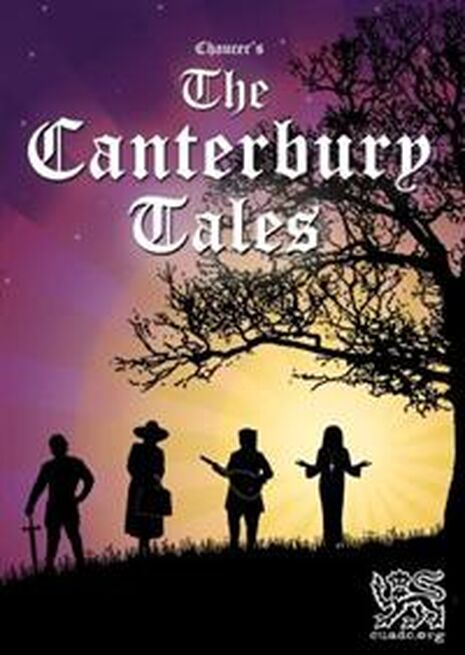Theatre: The Canterbury Tales
Though the show didn’t blow her away, Rivkah Brown is impressed by this production’s attempt at staging Chaucer
Stage adaptations of ‘The Canterbury Tales’ have, in the 600-odd years since its composition, rarely been attempted. The most recent was the RSC 2006 production, adapted by Mike Poulton; which, though well-received, was five and a half hours long. There are over 20 tales in Chaucer’s poem, and even though Elizabeth Schenk and Katie White did well in cherry-picking a handful, and going with Poulton’s brilliant adaption, their production was doomed to feel drawn-out.

The show got off to a wobbly start: there’s nothing wrong with a bit of Middle English on a Tuesday night, but Freddie Sawyer’s Prologue felt lacklustre and too rushed to be fully understood. The Knight’s Tale which followed was similarly disappointing: floods of crocodile tears and James Evans’ hammy death seemed to trivialise the tragic focal point of Chaucer’s narrative. Adding to this awkwardness were the weird ambient sound effects - some of which had clearly been put on a loop, punctuating the tale with stark 2-second silences.
The Tales soon picked up, however, as the Miller mercifully broke the ice with his tale. Jack Johnson gave a zesty, tipsy Miller; Robert Thomas, a burning-loined carpenter. However, Juliet Cameron-Wilson outdid both with her delightfully rambunctious Alisoun.
The directors stayed faithful both to the scandalising bawdiness of some tales, and the sobriety of others, allowing them to rub up against each other to create the compendious, all-embracing atmosphere that is uniquely Chaucer’s. However, for a production which promised an alternative take on the Tales, I was slightly deflated by the attempt at ‘puppetry’ in the Nun’s Priest’s Tale, reminding me of a haunted Tots TV.
The production was highly demanding of its actors, each of whom doubled up in two, often three roles. Whilst this multi-part acting underscored repeatedly the stiffness of some, it allowed others’ raw talent to shine through - notably Rochelle Thomas and Juliet Cameron-Wilson, who stole the show with their cheerful charisma and versatility.
Perhaps the greatest achievement of this production (as the theatrical rendering of a medieval classic) was its sense of occasion. Staging the tales also facilitated the creation of chemistry between the pilgrims: sparks flew between tellers, bitchy remarks were catapulted across stage, and at one point the tension erupted into full-blown violence. ‘The Canterbury Tales’ is difficult in print, let alone on stage, and, though the production didn’t blow me away, it was impressive, and certainly not unambitious.
 News / Cambridge study finds students learn better with notes than AI13 December 2025
News / Cambridge study finds students learn better with notes than AI13 December 2025 News / Cambridge Vet School gets lifeline year to stay accredited28 November 2025
News / Cambridge Vet School gets lifeline year to stay accredited28 November 2025 Science / Did your ex trip on King’s Parade? The science behind the ‘ick’12 December 2025
Science / Did your ex trip on King’s Parade? The science behind the ‘ick’12 December 2025 News / Uni Scout and Guide Club affirms trans inclusion 12 December 2025
News / Uni Scout and Guide Club affirms trans inclusion 12 December 2025 Arts / Modern Modernist Centenary: T. S. Eliot13 December 2025
Arts / Modern Modernist Centenary: T. S. Eliot13 December 2025









